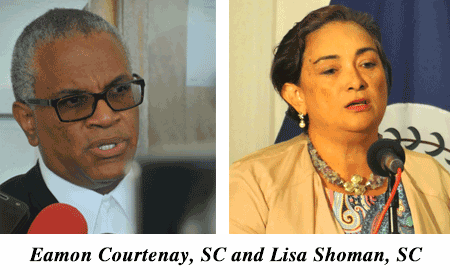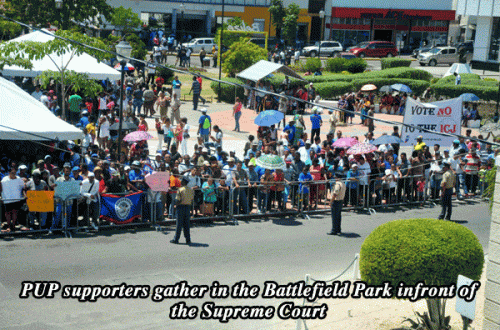Submissions made for interim injunction to stop ICJ referendum on April 10
BELIZE CITY, Mon. Apr. 1, 2019– Around 2:00 p.m., Battlefield Park on the Regent Street side was packed with supporters of the Opposition People’s United Party (PUP) as five parliamentarians and a standard bearer began to walk toward the Supreme Court.
They were soon joined by other executive members of the party as they made their way to the courtroom of Chief Justice Kenneth Benjamin.
Following three hours of submissions before the Chief Justice from the two sides, the claimants and the government attorneys, the Chief Justice thanked both sides for their submissions and announced that he would hand down his decision on Wednesday at 2:00 p.m.
The PUP claimants are Deputy PUP Leader, Hon. Cordel Hyde, area representative of Lake Independence; Hon. Mike Espat, area representative of Toledo East; Hon. Oscar Requeña, area representative of Toledo West; Hon. Rodwell Ferguson, area representative of Stann Creek West; Hon. Julius Espat, area representative of Cayo South; and Anthony Mahler, standard bearer of the Pickstock Division.
The claimants have filed a constitutional challenge to the Special Agreement (Compromis) signed in December, 2008, by Foreign Minister Wilfred “Sedi” Elrington.
The constitutional claim before the court is based on the argument that by signing the Special Agreement, the Foreign Minister violated the separation of powers doctrine, because he assumed powers that belonged to the Legislature, and in so doing, he bound the country to a treaty with the Republic of Guatemala.
The claim, therefore, is asking the court to declare the Special Agreement unconstitutional.
Before the substantive claim is heard, however, the claimants are asking the court to stop the April 10 referendum, in which Belizeans would vote to indicate whether or not the Guatemalan claim to Belizean territory should be adjudicated by the ICJ.
Both the claimants and the defendants in the case have filed written submissions. Today, they presented oral arguments to buttress their written submissions.
Appearing for the claimants are lead attorney Eamon Courtenay, SC, along with attorneys Anthony Sylvestre, Kareem Musa, Dean Molina, Gavin Courtenay and Illana Swift.
The government was represented by the PUP’s Lisa Shoman, SC; Deputy Solicitor General Elsa Montalvo; UWI professor Westmin James; and Crown Counsels Briana Williams and Agassi Finnegan.
In his submission, Courtenay told the court that the application for the interim injunction is dated March 8, 2019, and is supported by two affidavits of the first claimant, Michael Espat.
Courtenay also told the court that Prime Minister Dean Barrow requested from the Governor General a writ of referendum this past January.
“We are asking Your Lordship to restrain the defendants from holding the referendum,” Courtenay submitted.
Courtenay argued that the signing of the Special Agreement violated the separation of powers and that the Minister of Foreign Affairs did not have the capacity to bind Belize in the absence of legislative intervention.
Courtenay also submitted that the effect of the Special Agreement as amended by the protocol was to initiate and launch a process that, subject to the proposed referendum, is irreversible and adds a life of its own, subject to a yes vote on the referendum.
Guatemala already had their referendum.
There is nothing that can stop the process outlined in the Special Agreement, he said, right up to the demarcation of the boundaries of Belize.
“We submit firstly, My Lord, that the Minister of Foreign Affairs could not, without legislation supporting the existent power, have committed Belize to the Special Agreement. The Special Agreement, read as a whole, is an attempt by the Executive to empower the ICJ to amend the First Schedule of Belize Constitution and thereby exercise Legislative power, in violation of the separation of powers doctrine. Parliament’s legislative power is being fettered. What the Special Agreement does is to say that the Executive has empowered the ICJ to define the boundaries of Belize. Schedule 1, [which] already defines the boundaries,” said Courtenay.
Courtenay argued that what the Special Agreement does can only be done if it is supported by legislation.
The ICJ will determine the border differently from what is set out in the Constitution of Belize, and that would be a legal instrument in international law and Belize would be bound to accept the decision of the court, he said.
Citing what is known as the BCB decision from the Caribbean Court of Justice, Courtenay told the court that the CCJ “deplores exactly what we have here in colorful language.”
Courtenay went on to explain that the extradition treaty with the US and other countries cannot be done without domestic legislation.
“Here you have a treaty between Belize and Guatemala without any domestic legislation. The Special Agreement is being implemented and the most obvious way is the referendum,” he said.
“Prime Minister Barrow makes it clear that the referendum is for voters to take the dispute arising from Guatemala’s claim to the ICJ”, Courtenay explained.
The Governor General issued 31 writs of referendum instead of only one, when he responded to Barrow’s January 28 letter and the Governor General (GG) spoke of “proposed settlement” in his referendum writs, said Courtenay.
“Barrow’s letter does not ask the GG to issue a writ on the Special Agreement,” Courtenay told the court. “There is no prospect in the evidence of the Chief Elections Officer for a referendum to be held on any proposed settlement,” he said.
Courtenay went on to submit that under the Special Agreement, the government purported to commit the country to hold a referendum and that if it receives the approval of the people, the matter will then, as a matter of international obligation, proceed to the ICJ.
Citing the Alberto Vellos case which was appealed all the way to the Privy Council, Courtenay told the court that a referendum under the referendum act is advisory, consultative and non-binding.
“Under the laws of Belize, referendum only provides for advisory opinion. So is Belize in breach of the Special Agreement?” asked Courtenay.
“If the referendum proceeds on April 10, the constitutional rights of the claimants as members of parliament would be irreparably damaged. This is a classic case where one can say it is better to be safe than sorry,” he said.
“The claimants ask this court to be sure that there is legal certainty covering the single most important decision the nation of Belize has been called upon to make. Proceeding to the referendum without concluding these matters keeps alive an invalid referendum. An invalid referendum would result in substantial loss and embarrassment as a country in the international community. We ask Your Lordship to grant the interim relief,” said Courtenay.
The government side began their submission with Professor James submitting that the charge that the Executive could not enter into a treaty is purely academic.
James submitted that the matter is premature at this stage.
James went on to submit that the Special Agreement treaty has legislative approval. The Senate ratified the Special Agreement and there was no judicial review or constitutional challenge, James submitted.
James told the court that it is not for the court to determine if an international agreement is valid or not.
”You may need to change your domestic law to give effect to the ICJ decision”, James went on.
“They are asking for an extraordinary relief, to stop the referendum,” James declared.
James added, “The separation of powers does not operate as some concept that overrides the constitution itself.”
Even if there is a decision by the ICJ, the legislature can amend the constitution, James argued.
James went on to argue that the claimants have brought the wrong procedure to the court, that they should have gone by way of a judicial review.
James told the Chief Justice that he should not be looking at international law, because his court does not have the jurisdiction to do so, and that the referendum is being held under domestic law.
“No constitutional claim is being raised here”, James told the court. The government is under a duty to hold the referendum, he said.
James argued that whatever harm the applicants would suffer, the referendum will not determine the boundaries, and the applicants would suffer no financial loss. “The referendum will not determine the issue”, James told the court.
Following James’ submission, Shoman rose and told the court that the government is saying that they must conduct the referendum on April 10 in order to comply with their treaty obligation. “The greater harm will be suffered by Belize”, she said.
Shoman told the court that Attorney General Michael Peyrefitte, Emil Argüelles, Assad Shoman and Ambassador Alexis Rosado have all submitted affidavits which say they have legitimate expectations that a referendum will be held.
Shoman also argued that the claimants cannot claim greater harm, because they are not members of the Senate. It would be the defendants who would suffer greater harm.
Shoman told the court that the referendum train “ has already left the station and is fast moving toward its final destination.”
The claimants, Shoman argued, took legal advice on February 18 and filed the claim on March 7, and she reasoned that the claim was filed at the 11th hour. “The claimants have demonstrated no urgency”, said Shoman.
In his reply to the government attorneys’ submission, Courtenay told the court, “I was taken aback by some of the submissions laboring under some fundamental misunderstanding.”
Courtenay also told the court that the claim doesn’t make any determination about what the ICJ will decide.
As for the legitimate expectation of Peyrefitte, Argüelles, Shoman and Rosado, Courtenay told the Chief Justice, “If they have legitimate expectation, they should hire an attorney and bring their own claim. I invite Your Lordship to completely disregard them.”
D-Day for Belize is on Wednesday at 2:00 p.m.



